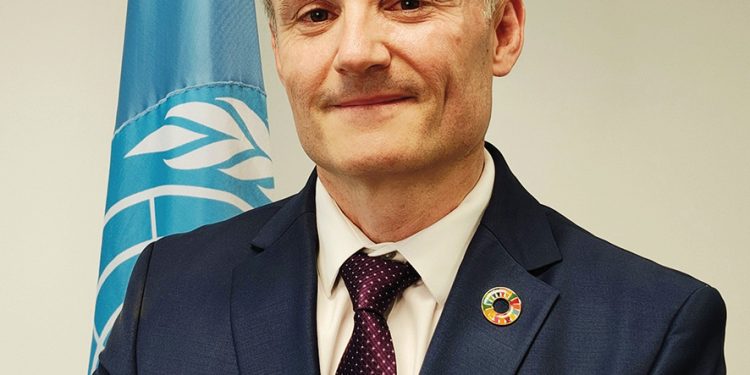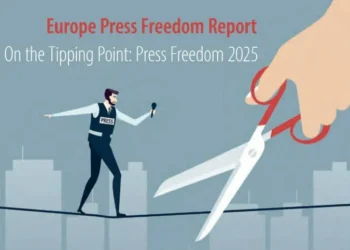Ahead of United Nations Day on October 24, GEORGIA TODAY interviewed the newly appointed UN Resident Coordinator Didier Trebucq to reflect on the progress the organization has made within Georgia, and to hear about its goals moving forward.
United Nations Day was established in 1945 and commemorates the official creation of the UN. On October 24, various events were held throughout Georgia, including a panel discussion on digital innovation aimed at young people. Additionally, Tbilisi’s well-known TV Tower was lit up in blue to celebrate the organization’s 79th anniversary.
“As the UN family, our projects are concentrated on five broad areas: governance, including strengthening legal and institutional reforms and enhancing the protection of human rights; economic development; equitable and inclusive access to quality, resilient, and gender-sensitive services; support to conflict-affected vulnerable persons; and climate change,” Trebucq tells us. “We also do some specialized projects, but primarily focus on those areas. We target more vulnerable groups, such as women, children, persons with disabilities, refugees, migrants, conflict-affected populations, and others, to assist them. In the education field, telemedicine is important too.
“In April 2024, a four-year joint program was launched by the United Nations Development Program, the World Health Organization, and the United Nations Economic Commission for Europe to improve air quality and public health outcomes related to air pollution with EUR four million in EU funding,” he says. “150 companies in the packaging cluster were supported in their transition to a green and circular economy through the EU-UN Initiative for Private Sector Competitiveness in Georgia. About 1,500 internally displaced and conflict-affected women benefitted from the EU4Dialogue project and became more self-sufficient and successful. The ENPARD-4 project strengthens inclusive and sustainable growth and enhances the well-being of people and communities living in Georgia’s rural areas.
“We look at these areas from different perspectives,” Trebucq notes. “The legislative level gives direct support to people, and community projects are implemented by various NGOs. The collaborative efforts aim to address the country’s immediate challenges and long-term developmental needs. At present, our assistance to Georgia is over $50 million each year, and we try to provide additional funds on top of this.”
What are some of the current difficulties or roadblocks the UN is facing in Georgia?
The past few years have been especially hard due to the extreme uncertainty and massive risks, the impact of the COVID-19 pandemic, food insecurity, inequalities, and the challenges of climate change, all of which demand the UN’s attention.
The UN has been a strong supporter of Georgia’s efforts toward inclusive, sustainable, and equitable development. Georgia has achieved a lot. It’s an upper-middle-income country, but this is a moment when Georgia has new growth opportunities. Georgia has a vast area of resources with educated people, and is in a strategic location that bridges Europe and Asia. This is to say nothing of the hydro-power sector. Georgia must turn some of these assets into improved production and manufacturing that benefits all. Development needs to reach more people, leaving no one behind, to eventually further reduce extreme poverty, especially in rural areas. That’s the main reason we’re supporting the Sustainable Development Goals (SDGs) in various countries, including Georgia.
I believe Georgia will take this opportunity to progress and demonstrate the benefits of development to its people.
What aims and achievements will be declared for Georgia on UN Day?
On United Nations Day, several aims and achievements related to Georgia’s partnership with the United Nations will be highlighted. First is the Sustainable Development Goals (SDGs). The UN system in Georgia works collectively to achieve the SDGs, focusing on sustainable development, greater well-being, capabilities, and social equality for all Georgians. Another focus will be the UN’s support and partnerships to achieve various national priorities, including economic well-being, health, human rights, education, agriculture, industry, environmental protection, gender equality, effective governance, and the rule of law. Also, the Summit of the Future and ground-breaking the Pact for the Future.
What was the Summit of the Future event and what role did Georgia play?
The Summit of the Future, held at the United Nations Headquarters on September 22-23, offered an opportunity for change to respond to today’s and tomorrow’s challenges. At the Summit, world leaders adopted a Pact for the Future, which includes 56 concrete actions to address pressing global issues. It outlines a new vision and commits to accelerating progress on the 2030 Agenda for Sustainable Development, integrating climate action with development efforts, reforming the UN Security Council and international financial architecture, promoting international peace and responsible use of new technologies, and empowering youth. The Summit also adopted a landmark Declaration on Future Generations, pledging to prioritize the well-being of future generations. The Summit endorsed a Global Digital Compact, outlining a bold vision for digital cooperation and Artificial Intelligence governance to accelerate sustainable development.
Georgia actively contributed to global discussions and participated in the Summit side events. Georgian Prime Minister Irakli Kobakhidze’s address at the Summit of the Future, highlighting peace, security, and digital cooperation, reflected a commitment to multilateralism and collaboration on shared global issues. We especially welcome the national commitment to accelerate the achievement of the Sustainable Development Goals by 2030 in collaboration with the international community.
This summit could pave the way for future gatherings focused on similar themes, ensuring that global governance remains responsive to emerging challenges.
What areas of development from the Pact for the Future pertain to Georgia, and how will they be executed?
All themes covered by the Pact, including peace and security, sustainable development, climate change, digital cooperation, human rights, gender, youth, and the transformation of global governance, are relevant to Georgia. For example, addressing climate change is a significant aspect of the Pact, aiming to mobilize finance for adaptation and renewable energy investments. This is particularly relevant for Georgia, where reducing carbon footprints and promoting renewable energy sources is crucial for sustainable development. The Pact promotes digital cooperation to enhance governance and facilitate development. Here in Georgia, this could involve initiatives aimed at improving digital infrastructure, which is crucial for healthcare, for example. It can also help ensure broader access to online resources, services, and innovation, thus creating social equity and economic opportunities. The Pact emphasizes a commitment to achieving the SDGs, which align with ongoing UN efforts in Georgia to enhance social equity and well-being. This includes mobilizing resources and strengthening stakeholder partnerships to advance development goals.
The Pact for the Future offers a comprehensive roadmap for addressing pressing global issues and inequities through an inclusive lens. By focusing on digital cooperation, intergenerational justice, youth empowerment, peace reforms, human rights, and financial inclusivity, the Pact seeks to address current challenges while strengthening societal resilience against future economic, environmental, and social shocks and crises. This initiative will revitalize and build upon existing efforts of the Sustainable Development Goals.
What role or accomplishments are you hoping to fulfill as the newly appointed UN Resident Coordinator?
The UN has a certain role in helping the country overcome hardships and promoting development and progress. As we are starting a new cycle of design of the UN Sustainable Development Cooperation Framework (UNSDCF) for 2026-2030, we need to work more on strategic priorities to link the Sustainable Development Goals and development policies at the national level and work together as a UN system to reach accurate results that reflect the needs of the current stage and the priorities of the country’s development. I see my role in creating a conducive environment for collaboration, where UN agencies can come together and develop joint strategies, strengthen partnerships with all stakeholders to accelerate the SDGs, and build a more resilient, equitable, and inclusive future.
I wish all the Georgian people, the Government of Georgia, and our national and international partners a happy United Nations Day!
Interview by Shelbi R. Ankiewicz














